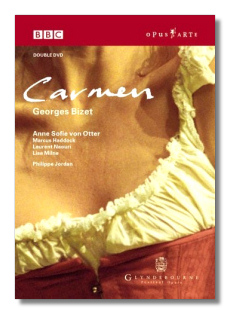
The Internet's Premier Classical Music Source
Related Links
- Bizet Reviews
- Latest Reviews
- More Reviews
-
By Composer
-
Collections
DVD & Blu-ray
Books
Concert Reviews
Articles/Interviews
Software
Audio
Search Amazon
Recommended Links
Site News
 DVD Review
DVD Review
Georges Bizet

Carmen
- Anne Sofie von Otter (Carmen)
- Marcus Haddock (Don José )
- Laurent Naouri (Escamillo)
- Lisa Milne (Micaëla)
Glyndebourne Festival Chorus
London Philharmonic Orchestra/Philippe Jordan
BBC Opus Arte OA0868D 2DVDs 220min
Director David McVicar calls Carmen "the first musical," and why not? It is crammed with familiar tunes one can whistle in the shower. More than that, McVicar powers this Glyndebourne production with the energy of Rent, and with the seediness of Cabaret. At the start of the opera, the soldiers aren't just bored and mischievous – they're angry, and when Micaëla turns up, rape is in their eyes. (The set places them, like the animals they are, in a virtual cage.) Even the street children who watch the changing of the guard are monsters of malice and mockery. Throughout Act One, I wondered if perhaps I was watching Wozzeck, not Carmen! The crotch-grabbing sexuality on display here will shock. And, when Don José murders Carmen at the end of the opera, we get a gruesome "slasher film" effect as her blood spatters and runs down the wall. In other words, this ain't your Aunt Mildred's Carmen.
This production eschews Guiraud's tension-diffusing recitatives in favor of the original spoken dialogue, and lots of it. (There's that connection with musicals again.) This is spoken with conviction (but, in a few cases, imperfect diction) by the international cast. Because it is done so theatrically, the dialogue isn't boring, and it explains the characters and their motivations better than the recitatives ever did. (For example, apparently Don José was studying for the priesthood when, while gambling, he killed a man, making it necessary for him to join the army instead.)
Anne Sofie von Otter's red-headed Carmen is an adorable brat, a diva of grunge chic, and the point around which this production turns. Impeccably sung (even when she has a cigar in her mouth!), she straddles the lightness of the Opéra Comique and the fatalistic throatiness of notable Carmens from the century just past. Her Don José, Marcus Haddock, is a doughy but dangerous momma's boy – there's something not quite right in his eyes from the get-go. With all those attractive soldiers next door, it is not clear why Carmen gravitates toward him. (Perhaps she has a death wish!) While Haddock can't find a light, melting Gallic timbre in his voice, he's satisfying in his role, and he manages some beautiful pianissimos – for example, in his duet with Micaëla. That role is sung by Lisa Milne, a maternal presence (!) with a young and pretty face. Again, Milne can't fully access an authentic French style and sound, but her sincerity and her shining voice see her through. As Escamillo, Laurent Naouri has the requisite charisma and charm. Vocally, he is not a heavy Escamillo. He is a real French baritone, which suits me fine. With very few exceptions, the cast does well in the smaller roles; even the guide who takes Micaëla to the smugglers' camp in Act Three makes a positive impression.
Conductor Philippe Jordan leads the cast in a brilliant, nuanced Carmen, although his stick technique is comically flashy. He actually seems to be fighting an imaginary bull during the Prélude. Fortunately, he's not on camera very much. As one expects, the choristers sing with precision, and each is given his or her personality in McVicar's production. The days of "stand here and sing" opera are past us, it seems.
The opera is divided among two DVDs, and it would be a shame if this causes more people to buy Deutsche Grammophon's inferior one-DVD Carmen from the Metropolitan Opera instead. As a bonus, Opus Arte offers a number of little documentaries on characterization, costuming, stage fighting, the Glyndebourne gardens, and so on. Nothing very insightful or surprising is presented therein.
Viewers can access either stereo or DTS-encoded surround sound; the visuals are Anamorphic Widescreen. The quality of both the sound and the visuals matches that of the production.
This Carmen was filmed during an actual production on August 17, 2002. The Glyndebourne audience ate it up. So will you.
Copyright © 2003, Raymond Tuttle


















